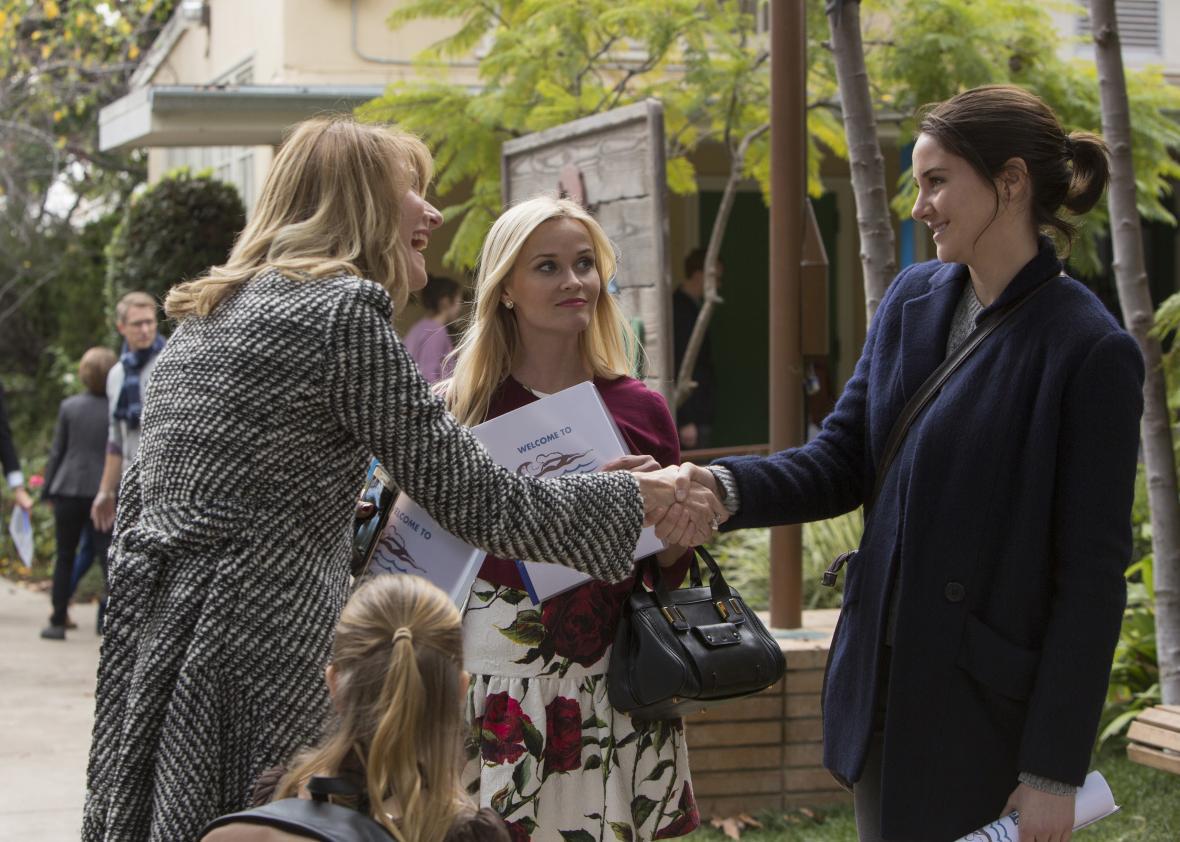“Feuds are never about hate,” Olivia de Havilland (Catherine Zeta-Jones) says in the premiere episode of FX’s Feud: Bette and Joan. “Feuds are about pain.”
“Feuds are about pain” sets the stage for an eight-hour catfight between two legendary Hollywood actresses, a conflict fueled by jealousy and resentment but rooted in a common experience of misogyny and ageism. Yet the line also foreshadows the didacticism of creator Ryan Murphy’s style, his tendency to stuff complicated ideas into dry, lengthy lectures. As my colleague Willa Paskin wrote in her review earlier this month, Murphy “takes one of history’s juiciest catfights and saps it of all its juice.”
No matter Feud’s shortcomings, though, de Havilland’s line rings true. It’s an idea rich with possibility, and it has indeed been effectively unpacked over the last several weeks, in a prestige limited series focused on the relationships between women of means and influence but also of a certain age. But it’s not happening on Feud. Look instead to Big Little Lies, HBO’s excellent new miniseries.
An adaptation of Liane Moriarty’s book, Big Little Lies is a hyperdomestic drama, teasing murder and scandal against the backdrop of secluded, wealthy Monterey, California. Its main setting is an elementary school, where the children of the show’s five main characters—Madeline (Reese Witherspoon), Celeste (Nicole Kidman), Renata (Laura Dern), Bonnie (Zoë Kravitz), and mysterious newcomer Jane (Shailene Woodley)—attend and befriend one another. But when a small alleged disagreement between Jane’s son and Renata’s daughter quickly escalates, the mothers take sides and the behind-the-scenes maneuvering begins at a rapid pace. Though Renata and Jane are the faces of the conflict, there’s no single feud in Big Little Lies. There are brewing squabbles between Renata and Jane, Renata and Madeline, and Madeline and Bonnie (the latter of whom is married to Madeline’s first husband)—and that’s all in addition to the little spats happening along the way.
Big Little Lies doesn’t shy away from the campy side of the tension. It employs the gifts of its cast to crackling effect. Witherspoon, in fine form, is the series’ joyously catty center; Madeline seems to revel in provoking Renata, the school’s Queen Bee, and takes almost perverse delight in the pushback she gets from her. She isolates her fellow travelers, namely Jane and Celeste, from the other side of the Mommy Wars and offsets for the boredom of stay-at-home life with the thrill of parental politics. Renata is an entirely different creation, a more flustered fighter. In the hands of Dern, master of the on-screen freakout, she’s a would-be ice queen undone by nerves, often roaming her ($12.4 million) beachside castle in a restless rage. There’s something so deliciously excessive about Renata, particularly when she’s left to her spacious balcony, wine glass in hand, pacing under the gorgeous California sunset, howling aimlessly toward the horizon. Yet Renata is no less outrageous in the smaller moments, when she places blame on potentially innocent young kids, relentlessly hounds schoolteachers and administrators, or hands out oblique insults like they’re PTA flyers.
Big Little Lies proudly occupies the territory that Feud tends to skirt—that of snickering, over-the-top camp. Yet it also outpaces Feud in the very area in which Ryan Murphy’s series stakes its claim. Big Little Lies grants us raw access into their interior lives and the hidden struggles behind their snarky instincts, and through its subtly nuanced readings of family and friendship, the show doesn’t dismiss the strength to be gained from even the most flawed of relationships. Witherspoon’s performance turns melancholic as the realities of Madeline’s loving but passionless marriage, increasing estrangement from her eldest daughter, and sense of missed opportunities in life all come into acute focus. Woodley’s Jane, intensely protective of her son—whom Renata labels a troubled bully—eventually discloses that her pregnancy was the product of a rape and that she’s determined not to see in her son what she knows of his father. In Renata, finally, there’s a desperation to her journey, her daughter’s refusal to communicate creating an unbearable emotional distance. Big Little Lies pulls off a neat trick, deconstructing the optics of the catfight while, at the same time, treating it as a spectator sport worth salivating over. It sounds like an unmanageable contradiction—not to mention conspicuously like FX’s misleading Feud marketing campaign—yet it works as an ingenious blend of substance and junk, achieving that tricky tonal balance that continues to elude Murphy.
In both Feud and Big Little Lies, the main battles reach brief détentes, and it’s here that the differences between the two series are made most clear. The former finds Bette (Susan Sarandon) and Joan (Jessica Lange) getting together for a drink after a day of shooting; they trade monologues about their difficult childhoods and their complicated mothers. It’s a smoothly engineered scene but less good drama than a well-meaning history lesson—explicit and talky, with dialogue too stiff for even Sarandon and Lange to fully cut through. Like the rest of the show, it doesn’t explore their dynamic so much as explain it.
Big Little Lies’ insights are messier. When Jane heads to Renata’s home to make peace—an earlier argument between them got way out of hand—the ensuing scene is darker and sadder than anything Feud has been able to provide. It offers a short glimpse of two moms connecting over their damaged children, not knowing what to do to help them. It’s spare, relative to Feud’s moment of unity, and authentic in its deceptive simplicity. Jane apologies, softly, and Renata returns the favor. (“Me too,” she whispers.) And then there’s a long stretch of quiet, as the two women merely look into each other’s eyes. It’s another reminder that Big Little Lies isn’t so prescriptive with what it’s trying to say; to both humorous and wrenching effect, the show fixates on the emotional underpinnings of its characters’ fraught relationships. It’s why Big Little Lies is more comfortable in silence, why it’s more comfortable with camp—why it’s more comfortable with pain.
